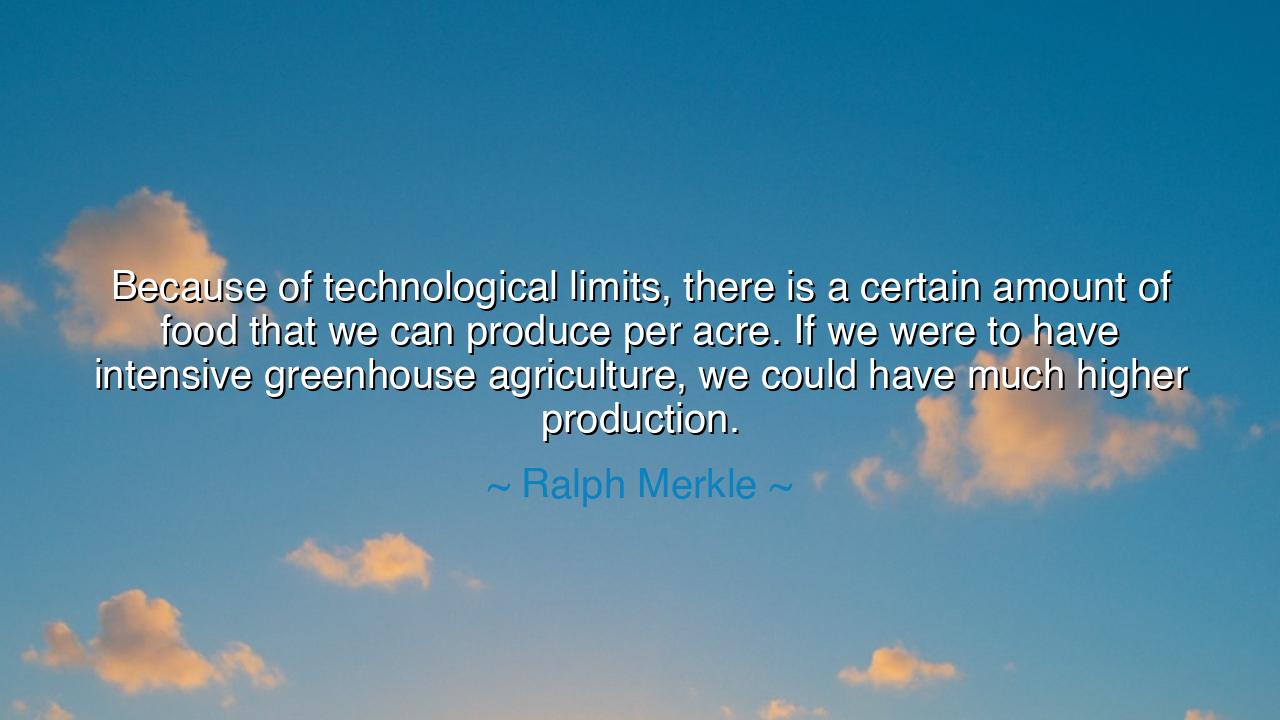
Because of technological limits, there is a certain amount of
Because of technological limits, there is a certain amount of food that we can produce per acre. If we were to have intensive greenhouse agriculture, we could have much higher production.






Hear the words of Ralph Merkle, who gazed upon the struggles of humankind and spoke with clarity: “Because of technological limits, there is a certain amount of food that we can produce per acre. If we were to have intensive greenhouse agriculture, we could have much higher production.” These words are not merely about soil and seed, but about the eternal dance between nature and invention, between the bounty the earth grants and the power of human ingenuity to multiply that bounty.
From the dawn of civilization, the measure of life has been bound to the harvest. A people could not dream of art, science, or empire until the stomach was filled. Yet each age faced its technological limits: the wooden plow that could not turn the deeper soil, the reliance on rainfall that often betrayed, the insects and blights that withered fields in silence. Every famine in history bore witness to this truth—that humanity’s destiny was tied to what the land alone could yield. Merkle’s words remind us that the field, as it stands, gives only so much, but the mind, if it dares, can create ways to give more.
Consider the great story of the Green Revolution of the twentieth century. In Asia and Latin America, hunger was rampant, and it seemed the land could give no more. But through new seeds, fertilizers, irrigation systems, and farming methods, harvests multiplied. Nations once crippled by famine fed their people, and millions of lives were saved. Here was the power of breaking technological limits—of refusing to accept the field’s natural yield as final. Just as Merkle foresees with greenhouse agriculture, humanity again and again has lifted the ceiling of production by daring to invent.
And what is this greenhouse agriculture that Merkle praises? It is the act of creating controlled worlds within glass, where sunlight, water, temperature, and nutrients bow to human command. Within these sanctuaries, plants thrive without season, immune to storm, frost, or pestilence. A single acre of greenhouse may feed more than ten acres of open soil, and deserts may bloom where once nothing grew. In such visions, we see humanity extending its covenant with the earth—not to exploit, but to refine, to coax forth life where nature alone could not.
Yet, O listener, let us not be deceived into thinking technology alone will save us. For every advance carries responsibility. Greenhouses demand energy, and energy demands wisdom. Fertilizers can nourish but also poison rivers if used without care. What Merkle offers us is not a promise without cost, but a challenge: if we wield this technology rightly, famine may vanish; if we wield it poorly, we may trade hunger for ruin. The field of tomorrow is not only in the soil, but in our hands and hearts.
The lesson is this: do not accept limits as final. Where the land seems exhausted, seek new methods. Where the harvest fails, search for innovations that honor both earth and man. Understand that technology is not a betrayal of nature, but an extension of humanity’s ancient calling to nurture life. As the plow once transformed wilderness into farmland, so may greenhouse agriculture transform scarcity into abundance.
Practical steps lie before you: embrace curiosity about how food is grown. Support innovations that increase yield without destroying the balance of the earth. Reduce waste, so that what is produced may reach every hungry hand. And above all, live with reverence for both the soil and the mind—the two forces that together sustain civilization.
Thus, remember Ralph Merkle’s words: “Because of technological limits, there is a certain amount of food we can produce per acre... but with greenhouse agriculture, much higher production is possible.” These words are not only about crops, but about life itself. Do not bow to limits. Break them with wisdom, with invention, and with compassion. For in doing so, you become heirs of humanity’s oldest quest: to bring forth abundance from the earth, and to feed not only the body, but the hope of generations yet to come.






AAdministratorAdministrator
Welcome, honored guests. Please leave a comment, we will respond soon